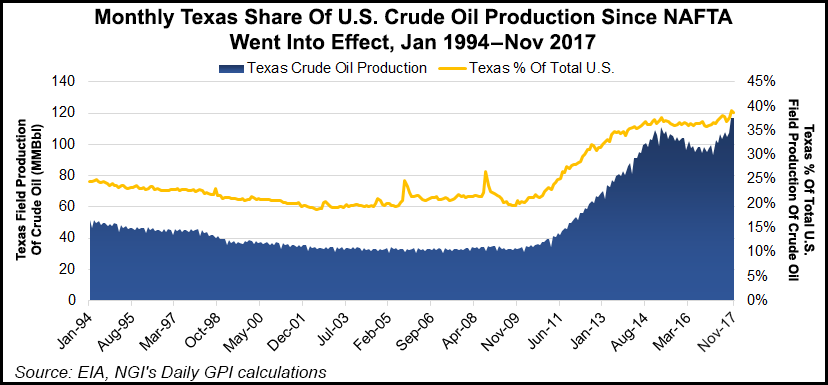Regulatory | NGI All News Access | NGI The Weekly Gas Market Report
‘Imperative’ for U.S. to Remain in NAFTA, Says Texas Energy Industry Chief
The Texas Oil & Gas Association (TXOGA) on Tuesday urged the Trump administration to think twice before withdrawing the United States from the North American Free Trade Agreement (NAFTA).

TXOGA President Todd Staples laid out the industry group’s agenda, noting that during fiscal year (FY) 2017, members together paid more than $11 billion in state/local taxes and state royalties, up from $9.4 billion a year earlier.
“The remarkable and sustained recovery of the Texas oil and natural gas industry is benefitting our state and local economies, providing the equivalent of $30 million a day for our schools, universities, roads and first responders,” said Staples. “What’s happening in Texas is the primary reason that our nation is a global power broker.”
During FY2017, Texas school districts received an estimated $1.1 billion in property taxes from mineral properties producing oil and natural gas, pipelines, and gas utilities, while counties received $336 million in mineral property taxes.
Staples traced many of the energy milestones to the state’s record production, expanding pipeline infrastructure and increased exports of liquefied natural gas (LNG) and oil.
“Recently released data shows that Texas produced nearly 40% of the nation’s crude oil when the United States crossed the 10 million b/d threshold,” he said. “Our crude oil imports are down 20% from 2006 and last month, our crude oil exports were more than double the average in January 2017.”
The United States last year also became a net LNG exporter, “and those exports are expected to increase more than 10-fold in 2019, thanks in part to the seven LNG facilities planned or under construction in Texas,” Staples said.
What’s happening in U.S. energy today was “unthinkable a decade ago,” which he said was “a direct result of Texans’ dedication to innovation and consistent regulations and policies.”
While the state’s ability produce unprecedented amounts of oil and natural gas “is a major contributor to our global leverage, production is only part of the story. Policy that encourages growth in the entire oil and natural gas sector is key to the Texas success story and is the foundation of our energy future.”
TXOGA’s priorities today are centered around pipeline growth, port expansions and refining, as well as lobbying for the United States to remain in NAFTA.
“Smart policy will keep Texas on top,” Staples said. “Maintaining state policies that allow us to expand our energy infrastructure — including pipelines, tanks, terminals, and refining capacity — is the best way to increase energy reliability and security and to protect our fuel supply in the event of a natural disaster.”
The Trump administration’s recently released budget included $13 million for a planned expansion of the Corpus Christi Ship Channel in South Texas, a deepwater port that increasingly is carrying more oil exports and eventually is set to deliver LNG to overseas markets.
NAFTA negotiations resumed this week in Mexico City. American Petroleum Institute chief Jack Gerard and other industry groups have argued for the United States to remain in NAFTA, a partnership with Mexico and Canada that President Trump has questioned.
Staples described the importance of the trade agreement to Texas.
“NAFTA has served as the essential framework that has allowed the oil and natural gas industry to see the growth and prosperity it has today, resulting in hundreds of thousands of jobs for Texans,” he said.
“We have a lot at stake as NAFTA negotiations continue because Texas is home not only to the oil and natural gas and the pipelines that transport it to Mexico, but also the refineries and petrochemical plants that make the products we export to our neighbors.”
Staples said it was “imperative to maintain the NAFTA provisions that enforce fair trade practices and allow our industry to remain competitive, grow jobs and invest with certainty.”
© 2024 Natural Gas Intelligence. All rights reserved.
ISSN © 1532-1231 | ISSN © 2577-9877 | ISSN © 1532-1266 |
